Nella mia esperienza di Erasmus a Francoforte ho avuto la fortuna di conoscere tante ragazze e ragazzi da ogni parte del mondo. Nello studentato dove abitavo, ho trovato tanti amici con i quali abbiamo condiviso le nostre storie, le nostre culture, mettendo in comune il nostro bagaglio culturale per arricchirci a vicenda.
È stato il caso di Yazan, mio amico palestinese che studia all’Istituto di Teatro, Film e Media della Goethe-Universität di Francoforte sul Meno. Una sera di Aprile in studentato abbiamo visto Bil Bet, il film che Yazan e una sua collega hanno prodotto. Dopo la visione e una discussione comune sul film, gli ho fatto la mia intervista.
Buona lettura!
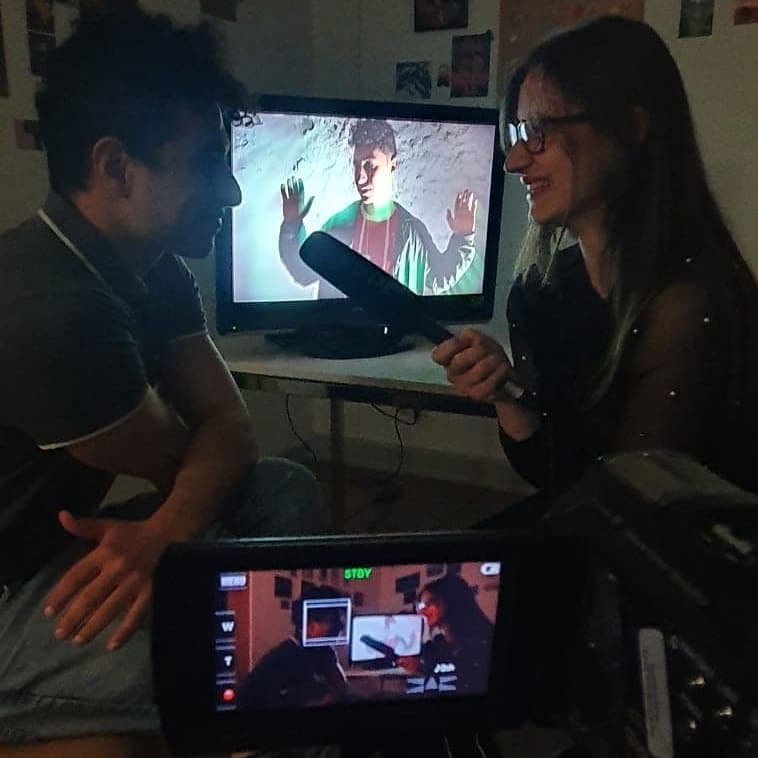
One, two, three… action!
Hallo Yazan! Who are you?
I don’t know… I’m still searching. It’s really a difficult question actually, for everybody. Especially for me. Maybe this is me, maybe. So, yes, I still don’t know. Maybe I’ll discover it soon, maybe never.
Okay, Okay…But, what’s your name, where are you from, what do you do in life?
Oh, this is easy. My name is Yazan and I’m 26 years old. I am palestinian and it’s seven years that I live in Germany. I came here to study. At first, I wanted to study something like natural science or biology because I wanted my parents to be proud of me.
But suddenly I just changed everything. I told myself: “ I want to do something I really like”.
So now I am studying theater and film.
Because of this I am not really appreciated by my family but I am happy. [laughs]
What’s your favorite food and movie?
I really like Maqloubeh.
About movies, I would say “The Big Lebowski”.
The most beautiful thing about your country, Palestine?
Maybe the fact that I was born there [everyone laughs].
I dont want to finde or think of the most beutiful thing there. I want to do what I think is the most beautiful thing everybody should.
What’s your dream?
I want to do something beautiful with my life.
With Mijriam, how was born the idea of the movie?
Mijriam also is half-Palestinian, her father is. We study together. The movie was a project for a seminar we attended.
The goal was mixing reality and fiction. We had to put something from real life and work on our imagination as well. We developed a character fleeing from his reality and described how this reality reflected in ourselves. That was the hard thing, finding a place and understanding our role in the story we created. We decided that we wanted to do something about Palestine but nothing about war, people dying, traumatic experiences or how much this tragically affects our life. We wanted to do something with humour. We didn’t want to tell that we are the weak part of something. Yes, at this moment we are weak due to countless historical reasons. But we wanted to share the message that we can deal with this terrible situation, be strong in this. We are not rotten.
What’s the movie about?
It is a challenging question. I think that every person can decide for herself or himself. For me it is actually about identity, finding oneselves. There are a lot of questions and they shouldn’t be all answered in the movie.
Rather there are a lot of things we question.
It is not a movie that provides answers but instead a lot of questions.
You can decide which one you want to ponder and think about.
The most frequent question that people ask me is: “does Yazan [the main character] find a destination?” and I actually don’t know. The person that watches the movie should decide.
Do you have concrete ideas to improve the situation in Palestine?
No…
What role do art and cinema play in the struggle for freedom against political conflicts?
I could use a lot of cliches to answer this question.
But I actually think that doesn’t matter what you are good at or what you do but you have to find something that people need.
If you write, if you play music, if you do theatre … every kind of art is always a new possibility and it is a tool.
I wouldn’t say that cinema has played a role. At this moment I made a film, but I still don’t know if I will make a difference or not. The certain thing is that I have a tool and I constantly ask myself: “how can I help?”
Art represents ideas and beliefs. When I hold my camera, write a story or a poem, I don’t think in the long run what will happen but “okay, I have this tool, let’s see how to use it”
I don’t think there is a best way to help the situation or something that is more powerful than the rest, but we should use the things we have in the right way.
How do you want to contribute in the fight for freedom?
Of course I want to change the situation. I know my country is facing a big problem: people being kicked out of their homes, losing their lives…
I ask myself: “what can I actually do?”
We shouldn’t have a pessimistic view. Everyone can do something.
I think this is also a theme that comes in the movie: we can’t just flee and get out from there. We can’t just think for ourselves. You won’t find another destination to be happy.
But you can change your ideas. I belong from there, I am from there, this is the reality I need to face. I have the responsibility to do something about it.
Something wrong is happening and it gets worse and worse. I can’t just say “I am done with it, I don’t care” and then go somewhere else pretending it doesn’t exist. If you like it or not, this is it.
It is important to not be selfish, we can always find a way to be part of the solution. We have a responsibility towards our families and old people.
In the movie you used special effects and interesting soundscapes…
The special effects weren’t actually from me. However, I really like them and I think they are nice. We are not professional, this movie was our first real experience so the special effects are the best we could manage to do.
Yazan and you are the same person?
We are not.
I don’t know. You asked me at the beginning who I am. This Yazan wants to do something, wants to face reality but that Yazan might express that part of me that just want to live his life and relax, just being away.
I am still asking myself what is my role and my responsibility. This is hard.
I wonder if moral code and ethic would disappear for a second what I would desire truly. Is it a trap?
Do you find your destination?
I am sure it will be a long journey.
Do you think that your happiness depends on where you live?
Sometimes I wonder if life would have been much easier if I was born in Europe. I think so.
It is a legitimate question to think about. Honestly I think a lot about this.
But in the end, happiness shouldn’t depend on where you live. If you can make you will make it. It wouldn’t matter in which situation you are.
Do you have any plans for the future?
To be still alive [he laughs].
Firstly, I have to finish my studies or I will be kicked out of Germany. I feel so lucky to study but it is time to finish. I don’t make plans anymore. My spirit is: if you don’t have a plan you can’t get disappointed. I have some wishes anyway.
I wish to finish very soon and to find stability so I can concentrate on real projects like writing and films.
You are doing a documentary to the students dorm…What is your project?
Actually it is an idea that I had in mind for a really long time. I really want to document our dorm life. I still have no idea on how it is going. There is concept in documentation called objective-observation. It is when you are part of the thing you document, so you are actually the object and subject at the same time. You are an insider and you document the life around you. In this way I get to understand more the atmosphere and the world I wanna tell and the result is more intimate. I really wanna do it but I don’t know what the outcome will be.
Let’s see.
Thank you Yazan. Good luck for your future!
I hope I wasn’t that silly. You can make sense making no sense, that’s my philosophy.
Buonanotte! (did I say it well?)
traduzione in italiano
Ciao Yazan! Chi sei tu?
Non lo so, sono ancora in ricerca di questa risposta.
È una domanda difficile per tutti, specialmente per me. Forse questo sono io, non lo so. Forse lo scoprirò presto, forse mai.
Okay, ma come ti chiami, da dove vieni, cosa fai nella vita?
Questo è semplice! Mi chiamo Yazan, ho 26 anni e sono palestinese, di Hebron. Ora vivo in Germania da sette anni. Inizialmente ero venuto qui per studiare medicina o qualcosa del genere, per rendere orgogliosa la mia famiglia. Poi mi sono detto “voglio fare quacosa che mi piace veramente” e ho cambiato tutti i piani. Mi sono iscritto all’Institut für Theater-, Film- und Medienwissenschaft della Goethe-Universität di Francoforte sul Meno.
Forse ho deluso le aspettative dei miei genitori, ma io sono felice.
Il tuo film e cibo preferito?
Di film preferiti ce ne sarebbero tanti, ma voglio dire “The Big Lebowski”.
Il Maqloubeh! È un piatto tipico della mia terra.
Qual è la cosa più bella della Palestina?
Certamente il fatto che io sia nato lì. [ridono tutti]
Non voglio trovare o pensare alla cosa più bella lì. Voglio fare quella che penso sia la cosa più bella che tutti dovrebbero fare.
Il tuo sogno?
Fare qualcosa di bello della mia vita.
Com’è nata l’idea di fare un film con Mirjam?
Io e Mijriam siamo colleghi di studi all’Università. Ci accomuna la Palestina, perchè suo padre è palestinese.
Il film era un progetto per un seminario a cui abbiamo partecipato.
L’obiettivo era mescolare la realtà con la finzione.
Abbiamo dovuto mettere qualcosa dalla vita reale e lavorare anche sulla nostra immaginazione. Abbiamo sviluppato un personaggio che fugge dalla sua realtà e poi abbiamo descritto come questa realtà come si riflette in noi. Questa è stata la cosa difficile, trovare un posto e capire il nostro ruolo nella storia che abbiamo creato.
Abbiamo deciso di voler fare qualcosa per la Palestina, ma niente per la guerra, le persone che muoiono, le esperienze traumatiche o quanto questo influenzi tragicamente la nostra vita. Volevamo fare qualcosa con umorismo. Non volevamo dire che siamo la parte debole di qualcosa. Sì, in questo momento siamo deboli per innumerevoli ragioni storiche. Ma volevamo condividere il messaggio che possiamo affrontare questa terribile situazione, essere forti in questo. Non siamo marci.
Vogliamo essere forti e vivere la vita al meglio.
Di cosa parla il film?
È una domanda impegnativa. Penso che ogni persona possa decidere per se stessa. Per me parla di identità, di trovare se stessi. Ci sono molte domande e non dovrebbero essere tutte risposte nel film.
Ci sono molte cose che mettiamo in discussione.
Non è un film che fornisce risposte, ma piuttosto molte domande.
Puoi decidere su quale riflettere e su cui pensare.
La domanda più frequente che le persone mi fanno è: “Yazan [il personaggio principale] trova una destinazione?” e in realtà non lo so. Puoi decidere tu stesso.
Hai idee concrete per migliorare la situazione in palestina?
No…
Che ruolo giocano l’arte e il cinema nella battaglia per la libertà, contro i conflitti politici?
Potrei usare molti cliché per rispondere a questa domanda.
In realtà penso che non importa in cosa sei bravo o cosa fai, ma devi trovare qualcosa di cui le persone hanno bisogno.
Se scrivi, se suoni, se fai teatro… ogni tipo di arte è sempre una nuova possibilità ed è uno strumento.
Non direi che il cinema abbia un ruolo ben definito. Al momento ho fatto un film, ma ancora non so se farò la differenza o no. La cosa certa è che ho uno strumento e mi chiedo costantemente: “Come posso aiutare?”
L’arte rappresenta idee e credenze. Quando tengo la mia macchina fotografica, scrivo una storia o una poesia, non penso a lungo termine cosa succederà ma nell’immediato: “Va bene, ho questo strumento, vediamo come usarlo”.
Non credo che ci sia un modo migliore per aiutare la situazione o qualcosa di più potente degli altri, ma dovremmo usare le cose che abbiamo nel modo giusto.
E tu, Yazan, vuoi fare parte di questa “buona battaglia”, vuoi aiutare a cambiare questa situazione?
Ovviamente voglio cambiare la situazione. So che il mio paese sta affrontando un grosso problema: le persone vengono cacciate di casa, perdono la vita …
Mi chiedo: “Cosa posso fare effettivamente?”
Non dovremmo avere una visione pessimistica. Tutti possono fare qualcosa.
Penso che questo sia anche un tema che arriva nel film: non possiamo semplicemente fuggire e uscire da un paese. Non possiamo pensare solo da soli. Non troverai un’altra destinazione per essere felice.
Ma non puoi cambiare le tue origini.
Appartengo da lì, vengo da lì, questa è la realtà che devo affrontare.
Ho la responsabilità di fare qualcosa al riguardo.
Sta succedendo qualcosa di sbagliato e peggiora sempre di più. Non posso semplicemente dire: “Basta, non mi interessa” e poi andare da qualche altra parte fingendo che quella situazione non esista. Se ti piace o no, c’è.
È importante non essere egoisti, possiamo sempre trovare un modo per essere parte della soluzione. Abbiamo una responsabilità nei confronti delle nostre famiglie e degli anziani.
Nel film avete usato effetti speciali e interessanti paesaggi sonori.
Gli effetti speciali in realtà non provenivano da me. Tuttavia, mi piacciono molto e penso che siano carini. Mirjam e io non siamo professionisti, questo film è stata la nostra prima vera esperienza, quindi gli effetti speciali sono semplicemente il meglio che siamo riusciti a fare.
Yazan, il protagonista del film e tu, siete la stessa persona?
Non lo siamo.
In realtà non lo so.
All’inizio mi hai chiesto chi sono.
Questo Yazan, me, vuole fare qualcosa, vuole affrontare la realtà, ma credo che il Yazan nel film, possa esprimere quella parte di me che vuole solo vivere la sua vita e rilassarsi, semplicemente stare lontano dalle situazioni problematiche.
Mi chiedo ancora qual è il mio ruolo e la mia responsabilità. Rispondere a questo è difficile.
Mi chiedo cosa vorrei veramente se il codice morale e l’etica scomparissero per un secondo. È una trappola?
Tu hai trovato la tua destinazione?
Sono sicuro che sarà un lungo viaggio.
Pensi che la felicità dipenda dal luogo in cui sei?
A volte mi chiedo se la vita sarebbe stata molto più facile se fossi nato in Europa. Credo di sì.
È una domanda legittima su cui riflettere. Onestamente ci penso molto.
Ma alla fine, la felicità non dovrebbe dipendere da dove vivi. Se puoi farcela, ce la farai. Non importa in quale situazione ti trovi.
Piani per il futuro?
Rimanere vivo [ridiamo].
In primo luogo, devo finire i miei studi o verrò cacciato dalla Germania. Mi sento così fortunato a studiare, ma è ora di finire.
Al momento non faccio progetti. Se non hai un piano non puoi rimanere deluso.
Ho comunque dei desideri.
Vorrei finire molto presto l’università e trovare una stabilità, in modo da potermi concentrare su progetti reali come la scrittura e i film.
Al momento hai in cantiere un progetto per fare un documentario sulla vita in studentato…
In realtà è un’idea che era in mente da molto tempo. Voglio davvero documentare la nostra vita in studentato. Non ho ancora idea di come stia andando. C’è un concetto nella documentazione, chiamato “osservazione-oggettiva”. È quando fai parte della realtà che documenti, quindi sei effettivamente oggetto e soggetto allo stesso tempo. Sei un insider e documenti la vita intorno a te. In questo modo riesco a capire di più l’atmosfera e il mondo che voglio raccontare e il risultato è più intimo.
Voglio davvero riuscire in questo progetto, ma non so quale sarà il risultato.
Vedremo!
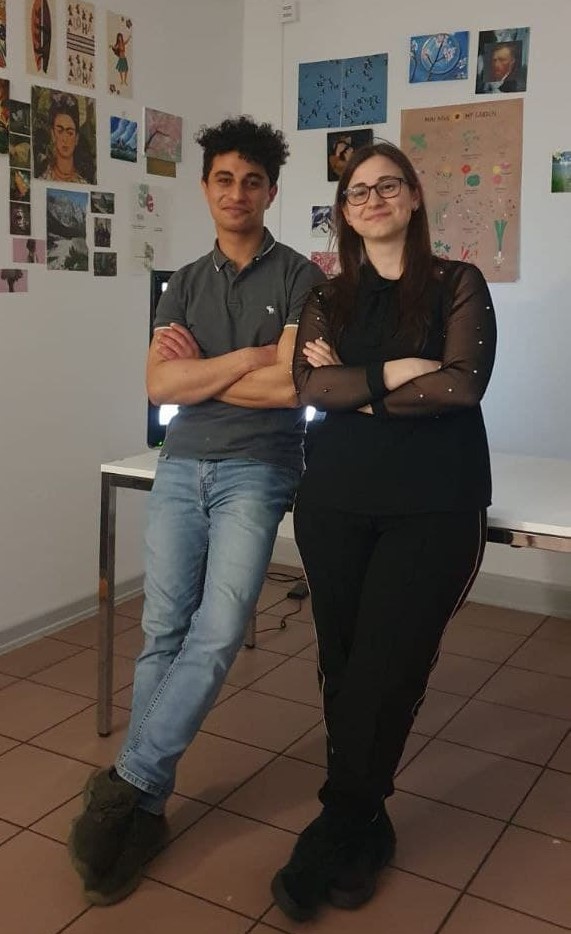
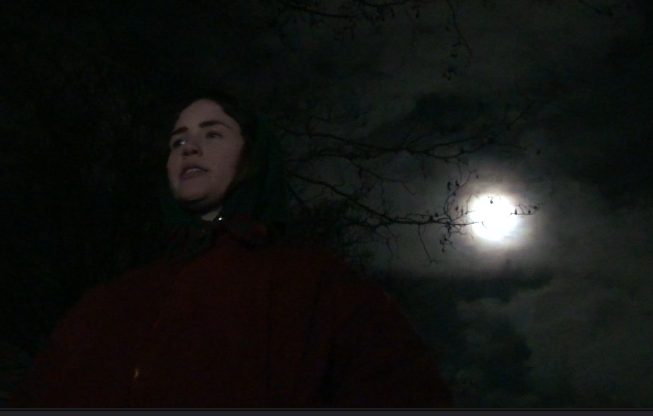
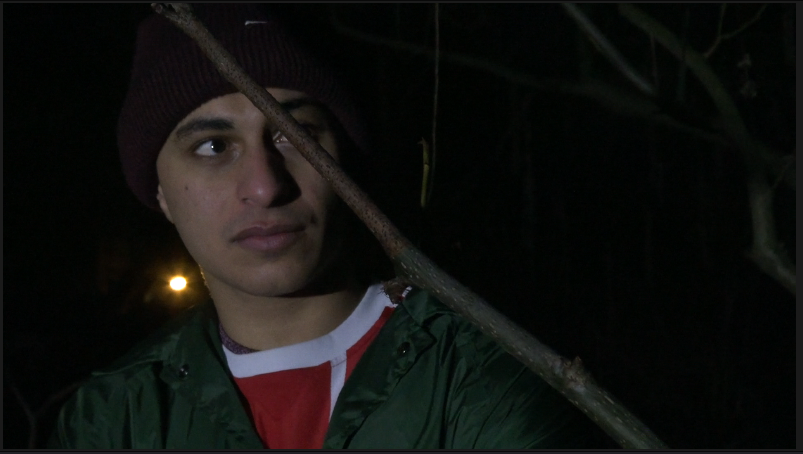
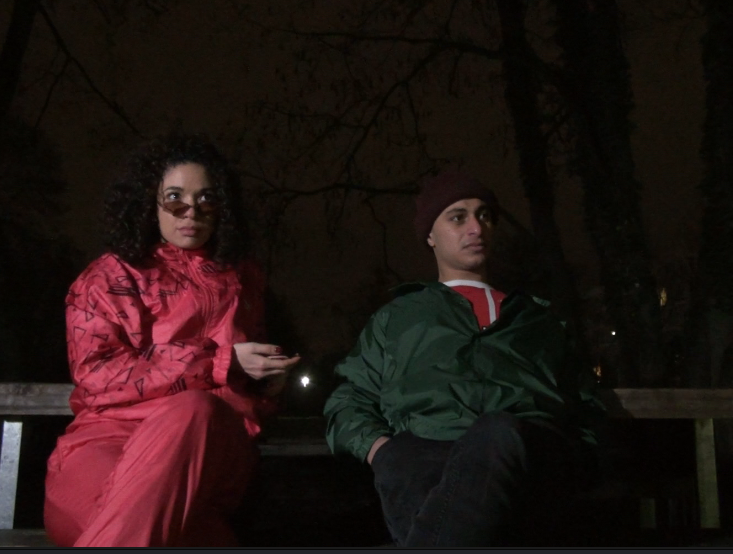
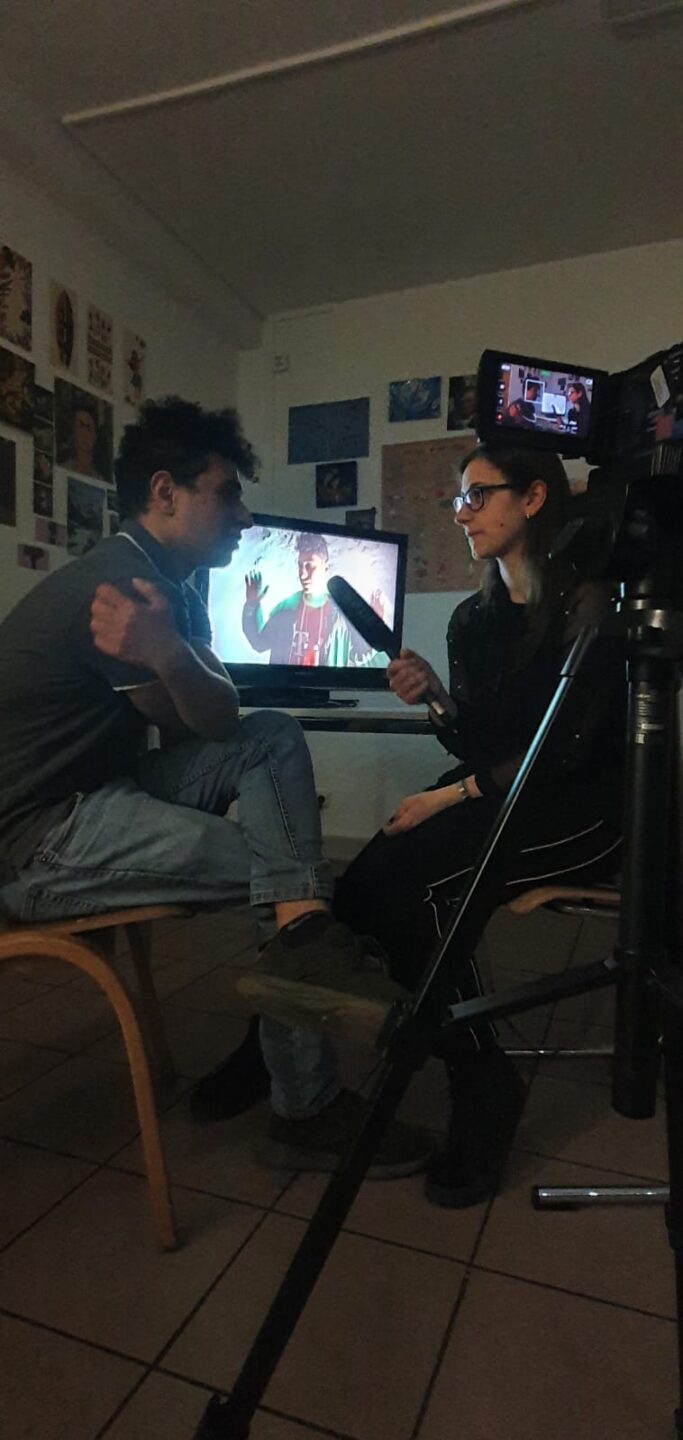
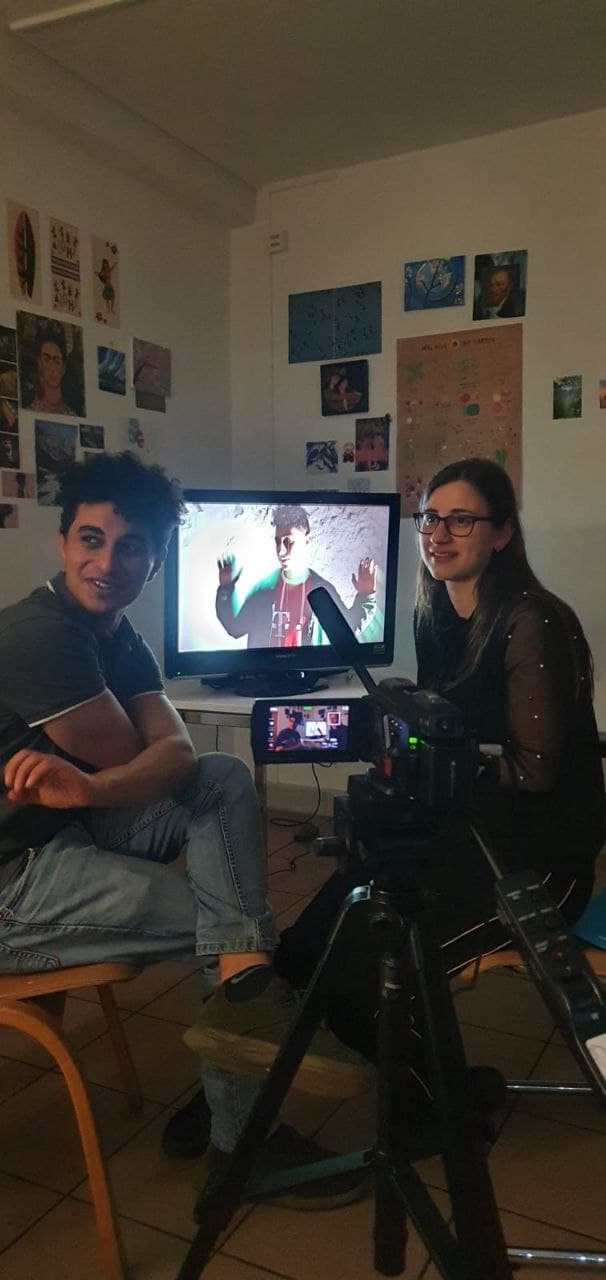
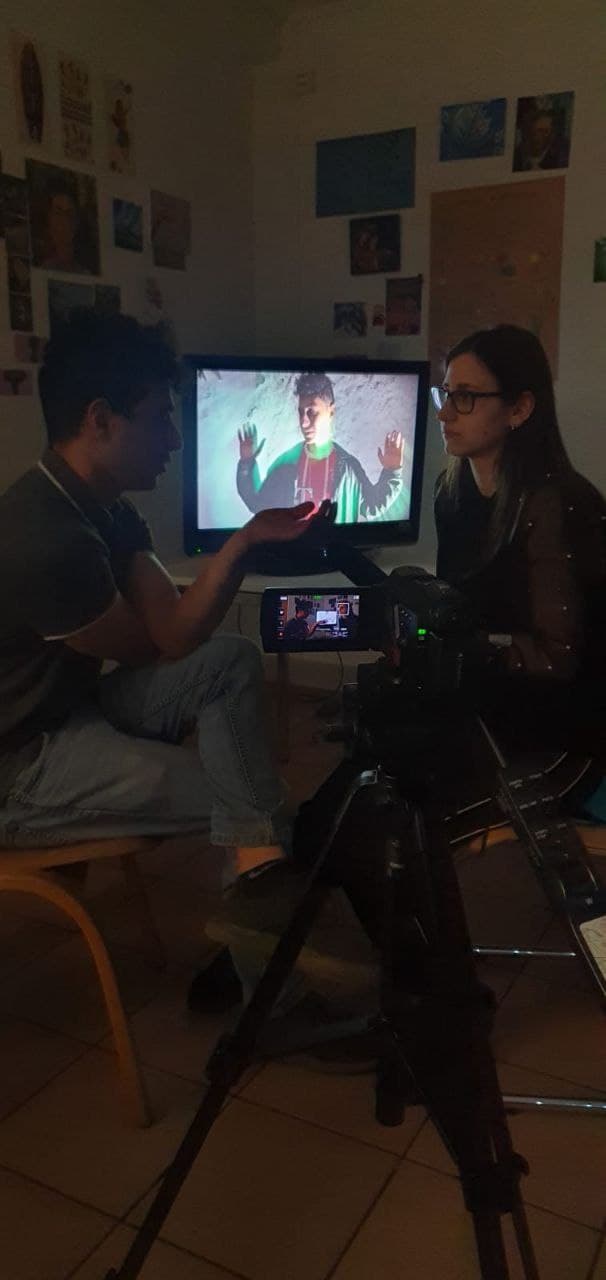
حسن!
Complimenti!